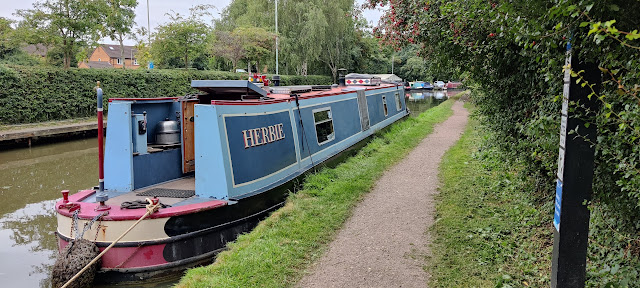Boaters, as if you hadn't got enough to spend your money on, here's something else we've been trying out for a year or so and we think you might want one (or some). The only problem is that I don't know what it's called. We just call it the fender adjuster thingy. Here is one.
You know the problem. The height of the bank you are mooring to varies, so if you want your mooring fenders to do their job you need to adjust the length of the line they hang from. You can do this with fancy knots or use this thingy which works really well and makes adjustment instant and easy. The line supporting the fender is the left hand one. You pull the other side out of the grip, hoist up or down as necessary and pull it back into the grip. Easy. Does it slip afterwards ? Never in our experience. It just stays put. You can get them from Tradline in Braunston.
And now for something completely different.
Nobody would ask me for advice on diet, needing as I do to lose three stone before I would start to look slim. Kath and I do enjoy our food, but I don't think we eat badly in terms of what we eat. In Braunston shop yesterday I walked straight past the Fray Bentos pies (often affectionately referred to as boaters' pies) and the cake shelf with hardly a second glance.
Since joining in with Prof Tim Spector's Zoe national covid reporting study during lockdowns etc. I have been following his work on diet.
Lately his big thing is the gut microbiome, the vast numbers of bacteria that live in our lower gut and digest our food for us, providing not only nutrition but also chemicals to help with the immune system and a host of other good things. Apparently every person's gut biome make up is different, because of all the many types of bacteria which can make it up, and this depends largely on what you eat to feed them. Tim's findings are based on lots of large scale scientific studies involving many thousands of people and apparently he is in the top fifty scientists on the planet in terms of being cited in other people's scientific papers. So by and large I believe what he says, and what he says simple. Avoid ultra processed foods, eat lots of different plants (not messed about with) and include some fermented foods in your diet. You don't have to be veggie or vegan, just have lots of plants. At first his suggestions sounds impossible because he recommends eating thirty different plants every week (although that does include herbs, spices, nuts, seeds etc.) Could I do this I wondered? Well I just totted up what plants we have eaten in the ten days or so we have been out on Herbie and it's 29!! To prove it, here's the list:
Lettuce, tomato, red pepper, butternut squash, potato, celery, strawberry, raspberry, blackberry, grape, melon, apple, oats, wheat bran, olive (in bread and in olive oil), orange, broccoli, rye(in bread), peas, cabbage, carrot, onion, rosemary, raisin, peanut, lemon (in a G&T), black pepper, basil (in pesto) and mustard.
I was amazed we had had so many. Some of course in very small quantity like the odd raisin in my muesli or the mustard. Most, but not all were eaten either raw or roasted or boiled /steamed but not otherwise processed. As for fermented foods we've had some different cheeses including a blue one, natural greek yoghurt, and kefir. So we very nearly got there. However . .
On the naughty side we have also had pork pie, sausages, faggots (at the Folly), pork chops, bacon, and chicken (in a Braunston butchers pie) so that's not at all good is it. So I've got absolutely zilch to brag about. No wonder we're overweight. Also there's alcohol, which I shall gloss over except to say that when we're on the boat we do tend to drink more booze. At home I can easily go a week without.
Anyway, the upshot is that thirty plants may not be so hard as you first think.













































